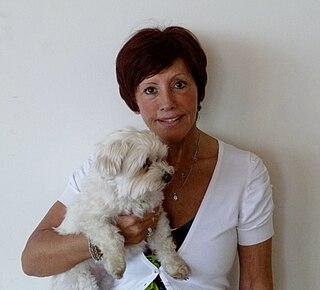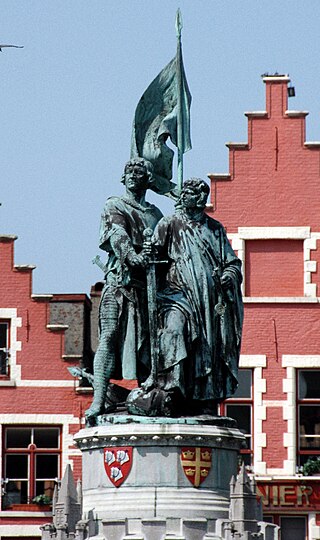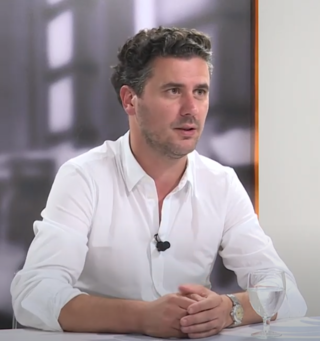
Greater Netherlands is an irredentist concept which unites the Netherlands, Flanders, and sometimes Brussels. Additionally, a Greater Netherlands state may include the annexation of the French Westhoek, Suriname, formerly Dutch-speaking areas of Germany and France, or even the ethnically Dutch and/or Afrikaans-speaking parts of South Africa. A related proposal is the Pan-Netherlands concept, which includes Wallonia and potentially also Luxembourg.

Limburgish refers to a group of South Low Franconian varieties spoken in Belgium and the Netherlands, characterized by their distance to, and limited participation in the formation of, Standard Dutch. In the Dutch province of Limburg, all dialects have been given regional language status, including those comprising ″Limburgish″ as used in this article.

Hugo F.V. Coveliers is a retired Belgian politician and lawyer. He was a member of the Belgian Chamber of People's Representatives between 1985 and 1995, and from 1993 to 2003. Since 2003, he has been a member of the Belgian Senate. He was a parliamentary chairman for the VLD in both chambers, from 1999 to 2003.

Jacky Lafon is a Flemish actress known for playing one of the lead fictional characters—Rita Van den Bossche—in the television series Familie that aired its first episode on the Flemish television channel VTM, in the Dutch language, on 30 December 1991. Familie remains a popular soap opera, airing its 1,000th episode in 1996 and as of 2016 is in its 25th year of production.
Het Belang van Limburg is a Dutch language regional newspaper in Belgium.

DPG Media Group is a Belgian media group. It is active in Belgium, the Netherlands, and Denmark. The exact ownership structure is not clear; it is believed that the group is mainly owned by the Belgian Van Thillo family. The company employs about 6,000 people.

Jan Breydel is credited with leading the Bruges Matins, a violent uprising against Philip the Fair. He is said to have played a major role in the Franco-Flemish War, even though his authenticity has since been questioned.
Wouter Vrancken is a Belgian football manager and a former defensive midfielder. He is the head coach of Gent after previous making his name at KV Mechelen and Genk.
Kim Geybels is a Belgian politician and a former member of the Belgian Senate for the N-VA and is a former chairman of the youth wing of the N-VA. Soon after her resignation she tried to retrieve her seat as Senator, claiming she was "forced" by the N-VA to resign. Early October 2010 all procedures, as started by Geybels, to retrieve her Senate seat had failed.

The Belgian provincial, municipal and district elections of 2012 took place on 14 October. As with the previous 2006 elections, these are no longer organised by the Belgian federal state but instead by the respective regions:

De Witte is a Belgian film of 1934 in black and white, directed by Jan Vanderheyden. It is an adaptation of the homonymous book by Ernest Claes.
Dylan Vanwelkenhuysen is a Belgian footballer who plays for K.V.K. Tienen-Hageland and works for Nike in his home country.

Elias Sierra-Cappelleti is a Belgian professional footballer who plays as a midfielder for Eerste Divisie club VVV-Venlo.
The Masked Singer is a Belgian reality singing competition television series based on the Masked Singer franchise which originated from the South Korean version of the show King of Mask Singer. It premiered on VTM on 18 September 2020. The first two series were hosted by Niels Destadsbader. The winner of the first series was Sandra Kim. The winner of the second series was Camille Dhont. The third and fourth series are hosted by Jens Dendoncker. Aaron Blommaert won the third series.
Tuur Rommens is a Belgian professional footballer who plays for Westerlo.
The second season of the Belgian Dutch-language television mystery music game show I Can See Your Voice premiered on VTM on 2 September 2022.

Kim De Witte is a Belgian politician who has been a member of the Belgian Federal Parliament since 2024.
Ferre Slegers is a Belgian professional footballer who plays as a winger for Dutch Eerste Divisie club MVV.
Hanne Vandewinkel is a Belgian professional tennis player. She has career-high rankings of No. 214 in singles, achieved on 21 October 2024, and No. 444 in doubles, achieved on 26 February 2024.

Joris Vandenbroucke is a Belgian politician and member of the Chamber of Representatives. A member of Vooruit, he has represented East Flanders since June 2019. He was a member of the Flemish Parliament from June 2005 to June 2009 and from June 2014 to May 2019.











